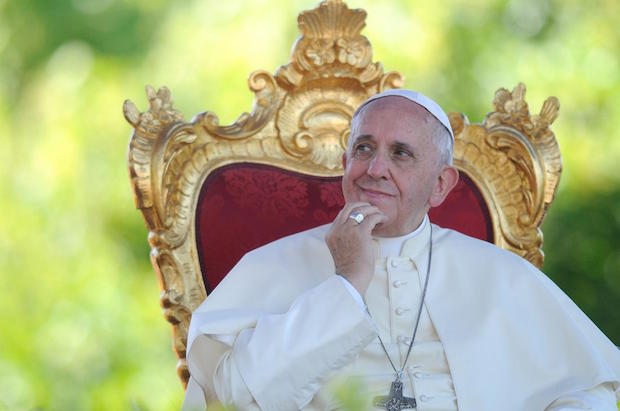Cardinal Oscar Maradiaga of Honduras, one of the most influential figures in the Catholic Church, has been accused of receiving hundreds of thousands of dollars from a Catholic university in his ceremonial role as its chancellor – and of investing more than $1.2 million in London financial companies, some of which has now allegedly vanished.
These claims form part of a set of spectacularly damaging but unproven allegations by the widely read Italian media outlet L’Espresso. You can read the report here; it also speculates about a ‘close and unseemly relationship’ between a bishop close to Maradiaga and a mysterious man apparently posing as a priest.
The accusations are a disaster for Pope Francis, recently the subject of a book called The Dictator Pope which portrays him – not necessarily fairly – as an ruthless opportunist who turns a blind eye to wrongdoing by members of his inner circle. In last week’s Holy Smoke Spectator podcast, I discussed it with two leading Catholic commentators. You can find the podcast here and also at the bottom of this blog post.
The Maradiaga scandal will not surprise anyone persuaded by the thesis of The Dictator Pope. For the Honduran cardinal is not a member of the sleazy Vatican old guard whom the Pope was elected to remove from office. On the contrary, he is one of Francis’s closest allies – an attention-seeking campaigner for social justice who would have liked to have been pope himself. Maradiaga dominates the Council of Cardinals hand-picked by the Pope to redesign the Curia; if any of the L’Espresso claims are true, Francis made a grave mistake by trusting him.
The bombshell was dropped immediately after the Pope, in his Christmas address to his staff, declared war on critics of his reforms (the nature of which remains unclear even though he has been in office since 2013).
In that speech, Francis seemed to be going after two figures who crossed him but aren’t suspected of corruption – Cardinal Gerhard Müller, sacked as Prefect of the Congregation of the Faith after opposing papal plans to relax the rules governing Communion for the divorced-and-remarried; and Libero Milone, the former Vatican auditor who says he was forced to step down earlier this year after uncovering suspicious activity by curial officials. (Both men have been treated disgracefully, in my opinion.)
Francis compared anti-reformist ‘plotters’ to ‘a cancer that leads to self-absorption, which also infiltrates itself into ecclesiastical organisms’. There was no implication that a prelate advancing his own progressive agenda might be up to his neck in financial skulduggery.
Yet, if L’Espresso is to be believed, and let me remind you that it produces no evidence, he was shown the dossier against Maradiaga in May. We’re told that his ‘hands went up to his skullcap’ in horror when he learned of the extraordinary sums of money allegedly passed to ‘his friend and main counsellor’.
According to the report, the Pope is ‘sad and saddened, but also very determined to discover the truth’. He wants to know every detail, including ‘the final destination of the jaw-dropping sums of money obtained by the cardinal’.
Are we to believe, then, that Francis kept Maradiaga in office for seven months while the outside world was told nothing of this scandal?
Some Catholic observers are speculating that Maradiaga is the victim of a hit job by forces inside the Secretariat of State, the sprawling department of the Pope’s ‘prime minister’ Cardinal Pietro Parolin.
Parolin’s increasingly powerful – and bullying – officials would be profoundly threatened by a a new model of Church government designed by the Council of Cardinals, known as the ‘C9’. Taking out its co-ordinator would effectively demolish this divided and unimpressive body – and also help Parolin position himself as a safe pair of hands to take over from Francis at the next conclave.
In other words, the old guard – some of whom voted to make Cardinal Bergoglio pope and are now regretting it – could be trying to replicate the chaos that forced Benedict XVI out of office.
Well, they’ve got their chaos, even though we now know that a team of journalist-hagiographers close to Francis are protecting him from inconvenient questions on board the papal plane, where he is famously at his most unguarded.
What they won’t get, I suspect, is a resignation. Jorge Bergoglio is not a quitter – or, to put it less diplomatically, he doesn’t care what his critics think so long as he can punish them.
But, though he may not realise it, his personal credibility is now so fragile that the office of the papacy is losing some of its spiritual authority. He has very little time in which to put matters right.







Comments